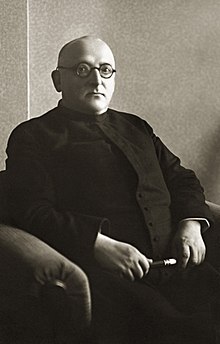Vladas Mironas | |
|---|---|
 | |
| 14th Prime Minister of Lithuania | |
| In office 24 March 1938 – 28 March 1939 | |
| President | Antanas Smetona |
| Preceded by | Juozas Tūbelis |
| Succeeded by | Jonas Černius |
| Personal details | |
| Born | 22 June 1880 Kuodiškiai, Kovno Governorate, Russian Empire |
| Died | 17 February 1953 (aged 72) Vladimir, Soviet Union |
| Political party | Lithuanian Nationalist Union |
| Alma mater | Vilnius Priest Seminary Saint Petersburg Roman Catholic Theological Academy |
Vladas Mironas (; 22 June 1880 – 18 February 1953) was a Lithuanian Catholic priest and politician. He was one of the twenty signatories of the Act of Independence of Lithuania and served as the Prime Minister of Lithuania from March 1938 to March 1939.
Mironas attended Mitau Gymnasium where his classmate was Antanas Smetona. They became friends and Mironas spent most of his life supporting Smetona's political ambitions. After graduating from the Saint Petersburg Roman Catholic Theological Academy, Mironas was ordained priest in 1904 and joined the Lithuanian cultural life in Vilnius. He was a member and co-founder of numerous Lithuanian societies and organizations, including the Lithuanian Education Society Rytas. He attended the Great Vilnius Seimas in 1905. He was a parish priest of Choroszcz (1907–1910), Valkininkai (1910–1914), and Daugai (from 1914). In 1917, he attended Vilnius Conference and was elected to the Council of Lithuania as its second vice-chairman. On 16 February 1918, he signed the Act of Independence of Lithuania. In late 1918, Mironas joined the Party of National Progress which merged into the Lithuanian Nationalist Union and was continuously elected to its leadership. He was elected to the Third Seimas in May 1926.
The coup d'état in December 1926 brought the Nationalist Union to power and Smetona became the President of Lithuania. In 1929, Mironas became the chief chaplain of the Lithuanian Army helping ensure its loyalty to Smetona. He had substantial influence in the new regime and handled some sensitive tasks, including attempting to mediate the conflict between Smetona and Augustinas Voldemaras. His contemporary diplomat Petras Klimas referred to Mironas as the éminence grise (grey eminence) of Smetona. Mironas became the successor of Juozas Tūbelis (Smetona's brother-in-law) as the Prime Minister of Lithuania after the Polish ultimatum in March 1938 and as chairman of the Lithuanian Nationalists Union in January 1939. Mironas considered the duties of Prime Minister to be a "heavy and unbearable burden" and his government did not introduce any significant reforms. He was replaced by Jonas Černius after the German ultimatum and the Klaipėda Region in March 1939.
Mironas then retired from politics. After the Soviet occupation of Lithuania in June 1940, Mironas was arrested by the NKVD in September 1940 but was freed from Kaunas Prison at the start of the German invasion of the Soviet Union in June 1941. He was arrested again by the Soviets in August 1944 and agreed to became an informant. However, he was reluctant cooperate and withheld information. He was arrested in January 1947 and sentenced to seven years in prison. He died at the Vladimir Central Prison in 1953.